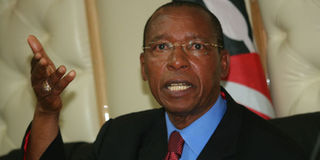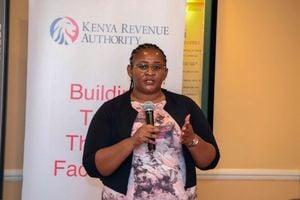Mutula on the spot over Bill

PHOTO | FILE Mr Kilonzo.
What you need to know:
- The Education committee wants to know how issues opposed by some stakeholders, including religious groups, will be addressed before the Bill is tabled in Parliament
- Sources at the meeting said Mr Kilonzo is scheduled to appear before the committee on Tuesday, before the MPs hold sessions with other interested groups
- In an earlier interview, Mr Kilonzo had expressed his willingness to accommodate divergent views and new ideas, saying the outcome should reflect the wishes of all Kenyans
- The new Bill seeks to repeal the current Education Act 211 of 1970 (revised 1980). It makes fundamental changes in the management and delivery of education
A parliamentary committee on Monday questioned Education minister Mutula Kilonzo on the controversy surrounding the Education Bill.
The Education committee wants to know how issues opposed by some stakeholders, including religious groups, will be addressed before the Bill is tabled in Parliament. (Editorial: Remove kinks in the Basic Education Bill)
The media were, however, kept out of the closed-door meeting at Parliament Buildings.
Sources at the meeting said Mr Kilonzo is scheduled to appear before the committee on Tuesday, before the MPs hold sessions with other interested groups.
Monday’s meeting, chaired by Mosop MP David Koech, lasted more than two hours.
In an earlier interview, Mr Kilonzo had expressed his willingness to accommodate divergent views and new ideas, saying the outcome should reflect the wishes of all Kenyans.
“I want consensus on the Bill and that is why I welcome and appreciate different views emerging from various groups and individuals,” he said. “The Bill belongs to the people,” he added.
Several stakeholders have faulted several clauses in the Bill, among them sections 53 and 54, which compel private schools to establish boards of management, similar in composition to those of public schools.
For example, private schools are expected to include civil society and commercial sector representatives in their boards.
Some religious organisations have opposed the Bill, saying it does not give them control over the schools they run, because the role of sponsors has been diluted. About 40 per cent of schools in the country were started by religious organisations.
The other contentious clauses relate to school admission. First, whereas section 28 prohibits public schools from charging tuition fees, section 31 generally outlaws charging of admission fees irrespective of whether it is a public or private school.
It states: “No person shall while admitting a child to a school or a basic education institution collect any admission fees.”
Since private schools charge fees as condition for admission, this section leaves them quite open to litigation. Should they admit without charging any fees, yet they are private establishments?
Second, article 33 (2) outlaws discrimination based on gender, age, ethnicity, race, colour, religion, among others. The question is: where does this leave single-sex schools? Will it compel the boys- or girls -only schools to admit students of the other gender?
The new Bill seeks to repeal the current Education Act 211 of 1970 (revised 1980). It makes fundamental changes in the management and delivery of education.
The Bill was drafted after a series of consultations, starting with the recommendations of a taskforce set up last year and led by former Moi University vice-chancellor Douglas Odhiambo.




